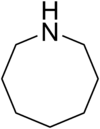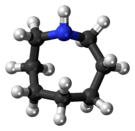Azocane
| |||
| Names | |||
|---|---|---|---|
| IUPAC name
Azocane | |||
| Other names
Azacyclooctane; Heptamethyleneimine; Octahydroazocine; Perhydroazocine | |||
| Identifiers | |||
| 1121-92-2 | |||
| 3D model (Jmol) | Interactive image | ||
| ChEBI | CHEBI:38792 | ||
| ChemSpider | 13638 | ||
| ECHA InfoCard | 100.013.039 | ||
| PubChem | 14276 | ||
| |||
| |||
| Properties | |||
| C7H15N | |||
| Molar mass | 113.20 g·mol−1 | ||
| Density | 0.896 g/mL | ||
| Boiling point | 51 to 53 °C (124 to 127 °F; 324 to 326 K) (15 mmHg) | ||
| Except where otherwise noted, data are given for materials in their standard state (at 25 °C [77 °F], 100 kPa). | |||
| | |||
| Infobox references | |||
Azocane is a heterocyclic organic compound with the molecular formula C7H15N. It consists of a saturated eight-membered ring having seven carbon atoms and one nitrogen atom attached to a single hydrogen atom. The fully unsaturated analog of azocane is azocine.
Although azocane has limited uses, two examples include Guanethidine & Trocimine.
References
This article is issued from Wikipedia - version of the 11/6/2016. The text is available under the Creative Commons Attribution/Share Alike but additional terms may apply for the media files.

